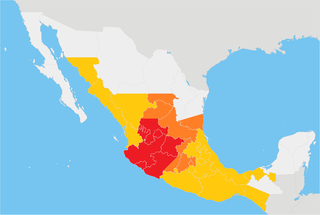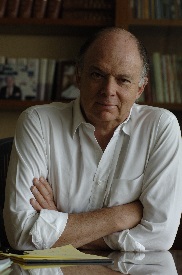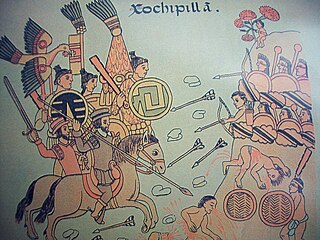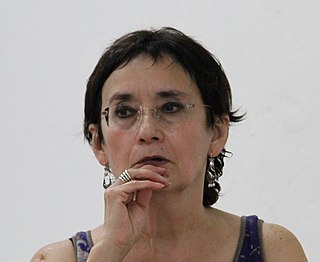
The Cristero War, also known as the Cristero Rebellion or La Cristiada, was a widespread struggle in central and western Mexico from 3 August 1926 to 21 June 1929 in response to the implementation of secularist and anticlerical articles of the 1917 Constitution. The rebellion was instigated as a response to an executive decree by Mexican President Plutarco Elías Calles to strictly enforce Article 130 of the Constitution, a decision known as Calles Law. Calles sought to limit the power of the Catholic Church in Mexico, its affiliated organizations and to suppress popular religiosity.

Enrique Krauze Kleinbort is a Mexican historian, essayist, editor, and entrepreneur. He has written more than twenty books, some of which are: Mexico: Biography of Power, Redeemers, and El pueblo soy yo. He has also produced more than 500 television programs and documentaries about Mexico’s history. His biographical, historical works, and his political and literary essays, which have reached a broad audience, have made him famous.
Arturo ('Jack') Warman Gryj was a Mexican anthropologist, member of the cabinets of Carlos Salinas and Ernesto Zedillo, also an author of nine books, two of which have been translated to English. He also wrote multiple articles for the magazine Nexos. He has also taught social epistemology at the University of Chile.
Antonio Alatorre Vergara was a Mexican writer, philologist and translator, famous due to his influential academic essays about Spanish literature, and because of his book Los 1001 años de la lengua española.

Alí Chumacero Lora was a Mexican poet, translator, literary critic and editor. He was a member of the Mexican Academy of Language.

The Mixtón War (1540-1542) was a rebellion by the Caxcan people of northwestern Mexico against the Spanish conquerors. The war was named after Mixtón, a hill in Zacatecas which served as an Indigenous stronghold.
Fondo de Cultura Económica is a Spanish language, non-profit publishing group, partly funded by the Mexican government. It is based in Mexico but it has subsidiaries throughout the Spanish-speaking world.

The Battle of Calderón Bridge was a decisive battle in the Mexican War of Independence. It was fought in January 1811 on the banks of the Calderón River 60 km (37 mi) east of Guadalajara in present-day Zapotlanejo, Jalisco.
Claudio Lomnitz is the Campbell Family Professor and Chair of the Anthropology Department at Columbia University. Prior to teaching at Columbia, Lomnitz was a Distinguished University Professor of Anthropology and Chair of the Committee on Historical Studies at the New School University. He served at different points in time as co-director of the University of Chicago's Mexican Studies Program, Director of the University of Chicago's Latin American Studies Program, and Director of Columbia University's Center for the Study of Ethnicity and Race. He has also taught at University of Chicago, where he was Professor of History, New York University, El Colegio de México, and Universidad Autónoma Metropolitana Iztapalapa, in Mexico City. At the New School University, Lomnitz served as editor of the academic journal Public Culture between 2006-2011. He also co-edited, with Fernando Escalante Gonzalbo, the collection "Umbrales" in Mexico's Fondo de Cultura Económica. In 2020 he was elected member of Mexico's El Colegio Nacional (Mexico).

Manuel Lozada, nicknamed "The Tiger of Álica", was a regional caudillo based in the region of Tepic, Mexico. He was born in 1828 in the Tepic Territory, Mexico and died on July 19, 1873, in Loma de los Metates, Nayarit.

Ricardo Lancaster-Jones y Verea, MA BE KHS was a Mexican historian and scholar who made significant contributions toward the study of the haciendas of the State of Jalisco (Mexico) in the twentieth century. His enthusiasm for history led him to become a professor of Regional History at the Faculty of Philosophy and Letters of Universidad Autónoma de Guadalajara in 1965. Later on, in 1973, he earned his MA degree in Latin American Studies at the University of New Mexico.

Professor Jacques Lafaye, is a French historian who, from the early 1960s has written influentially on cultural and religious Spanish and Latin American history. His most popular work is Quetzalcoatl and Guadalupe written in 1974 regarding the formation of the Mexican National Consciousness and includes a prologue by Octavio Paz and is regarded as a keystone for the understanding of the contemporary Mexican culture and is regarded as one of the most comprehensive analyses of the colonial period in Mexico.
Carlos Marichal is a Mexican economic historian who currently works at El Colegio de México, where he has taught since 1989. He has done research and published widely on the economic and financial history of Latin America.
Blanca López de Mariscal or Blanca Guadalupe López Morales is a Professor emeritus and researcher in literature at Tecnológico de Monterrey, Campus Monterrey, México.

David Anthony Brading FRHistS, FBA, is a British historian and Professor Emeritus of Mexican History at the University of Cambridge, where he is an Emeritus Fellow of Clare Hall and an Honorary Fellow of Pembroke College. His work has been recognized with multiple awards including the Bolton Prize in 1972, the Order of the Aztec Eagle, and the Medalla 1808—both of which were awarded by the Mexican government—and the Medal of Congress from the Peruvian government in 2011.
François Chevalier was a distinguished French historian of Latin America. His most well-known publication is La formation des grands domaines au Mexique. Translated to Spanish (1956) and English (1963), it is a classic and pioneering work on agrarian history in colonial Mexico, a point of departure for later studies of Mexican haciendas sparking a discussion on whether they were fundamentally feudal or capitalist.

Guadalupe Dueñas was a 20th-century Mexican short story writer and essayist.

María Teresa Rojas Rabiela is an ethnologist, ethnohistorian, Emeritus National Researcher and Mexican academic, specializing in Chinampas of Mexico's Basin, history of agriculture, hydraulics, technology, and labor organization in Mesoamerica during pre-Columbian and colonial eras, as well as historical photography of Mexico's peasants and indigenous people. She is recognized as a pioneer in historical studies on earthquakes in Mexico. From 2018 to 2021, Rojas Rabiela was involved in the restoration of the section of the pre-Hispanic aqueduct of Tetzcotzinco, Texcoco, known as El caño quebrado.

Antonio Rojas, nicknamed El Matacuras, was a Mexican Guerrilla who participated in the Reform War and the Second French intervention in Mexico. He fought independently in both wars due to his differing and controversial strategies and tactics throughout both wars until being killed at Mascota, Jalisco.












